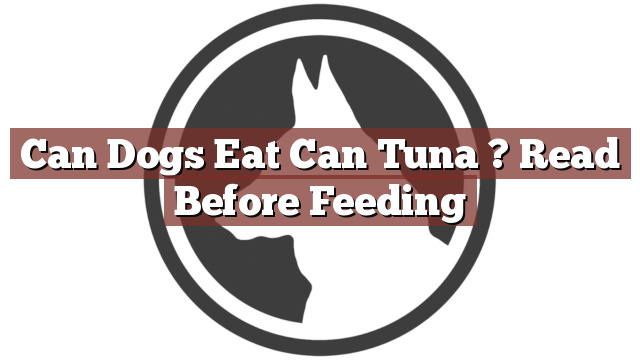Understanding Your Dog’s Dietary Needs
As a responsible pet owner, it is important to understand your dog’s dietary needs to ensure their health and well-being. Dogs are omnivores, which means they can eat a variety of foods including meat, vegetables, and grains. However, not all human foods are safe for dogs to consume. It is crucial to be aware of what is safe and what is potentially harmful to your furry friend.
Can Dogs Eat Can Tuna? Read Before Feeding
Can dogs eat canned tuna? This is a common question among dog owners who want to share their favorite seafood with their four-legged companions. The answer is yes, dogs can eat canned tuna, but there are certain factors to consider before offering it as a treat.
While tuna is generally safe for dogs, it is important to ensure that it is packed in water and not oil. The oil used in canned tuna can contain high amounts of sodium or other additives that may be harmful to your dog’s health. Additionally, some brands of canned tuna may contain added flavorings, spices, or preservatives that are not suitable for dogs. Therefore, it is crucial to read the label and choose a plain, unseasoned variety of canned tuna if you decide to feed it to your dog.
Pros and Cons of Feeding Tuna to Your Dog
Feeding your dog canned tuna can have both pros and cons. On the positive side, tuna is a good source of lean protein and omega-3 fatty acids, which are beneficial for your dog’s overall health. These nutrients can contribute to a healthy coat, skin, and immune system. Furthermore, canned tuna is convenient, affordable, and readily available, making it a tempting option for dog owners.
However, there are some potential drawbacks to consider before including tuna in your dog’s diet. One concern is mercury levels, as some types of fish, including tuna, can contain high levels of this toxic metal. While occasional consumption may not pose a significant risk, it is important to moderate the amount of tuna you offer your dog to minimize potential mercury exposure.
Another factor to consider is the potential for allergies or sensitivities. Just like humans, dogs can have allergies to certain foods, including fish. If you have never fed your dog tuna before, it is advisable to introduce it gradually and monitor for any adverse reactions such as vomiting, diarrhea, or skin irritation.
In Conclusion: Make an Informed Decision for Your Canine Companion
In conclusion, dogs can eat canned tuna, but there are important considerations to keep in mind. Choose plain, unseasoned varieties packed in water to avoid harmful additives. Moderation is key when feeding tuna to your dog due to mercury concerns, and it is advisable to monitor for allergies or sensitivities. As always, it is recommended to consult with your veterinarian before making any major changes to your dog’s diet, including introducing new foods.
By understanding your dog’s dietary needs and making informed decisions, you can ensure that your canine companion receives a balanced and healthy diet that supports their overall well-being. Remember, a well-fed and nourished dog is a happy and healthy companion.
Thank you for taking the time to read through our exploration of [page_title]. As every dog lover knows, our furry friends have unique dietary needs and responses, often varying from one canine to another. This is why it's paramount to approach any changes in their diet with caution and knowledge.
Before introducing any new treats or making alterations to your dog's diet based on our insights, it's crucial to consult with a veterinarian about [page_title]. Their expertise ensures that the choices you make are well-suited to your particular pet's health and well-being.
Even seemingly harmless foods can sometimes lead to allergic reactions or digestive issues, which is why monitoring your dog after introducing any new food item is essential.
The content provided here on [page_title] is crafted with care, thorough research, and a genuine love for dogs. Nevertheless, it serves as a general guideline and should not be considered a substitute for professional veterinary advice.
Always prioritize the expert insights of your veterinarian, and remember that the health and happiness of your furry companion come first.
May your journey with your pet continue to be filled with joy, love, and safe culinary adventures. Happy reading, and even happier snacking for your canine friend!

